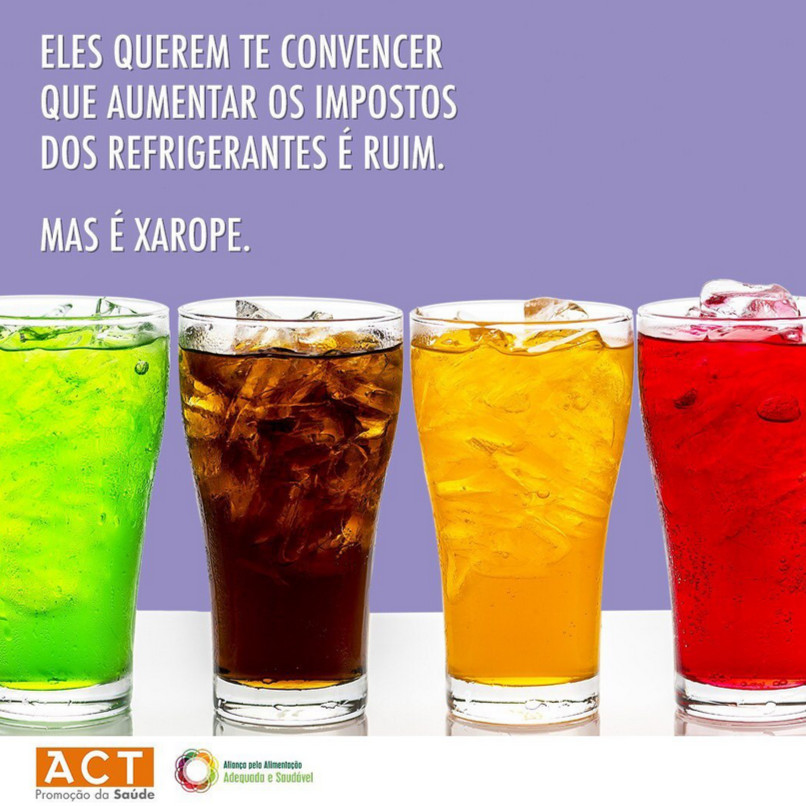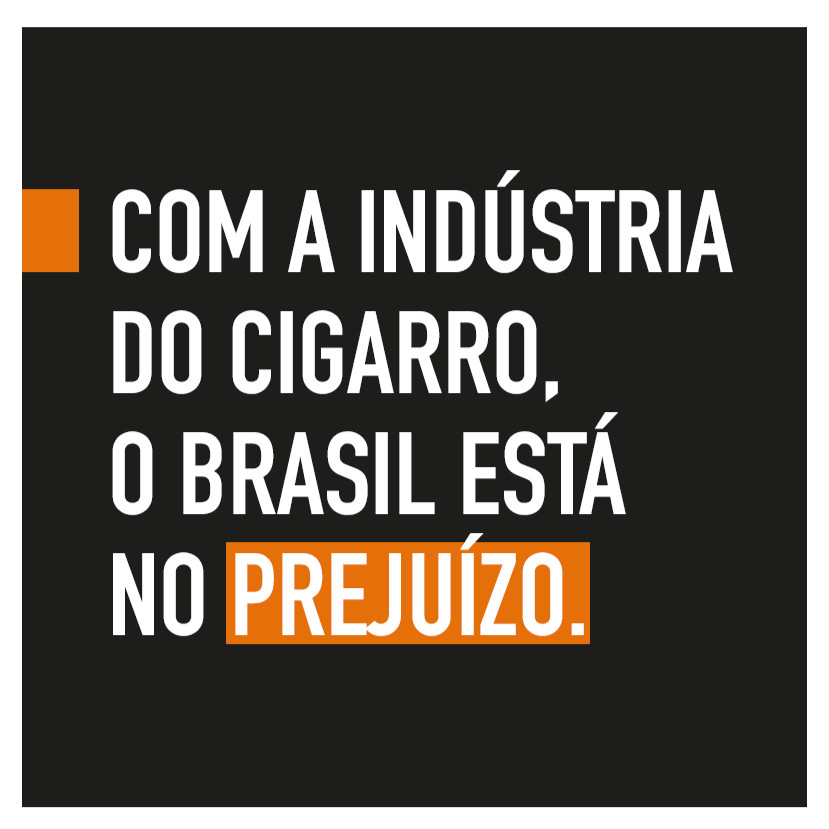monitorACT - December
20.12.21ACT Promoção da Saúde

Editorial
This edition of MonitorACT was marked by two global meetings of extreme importance to the health of humanity and of the planet, The Conference of Parties on Climate and Tobacco, both originating from international treaties to which Brazil is a signatory.
In the text called Green make-up or true commitment?, the authors start off from this question to assess the 26th UN Climate Change Conference (COP 26), which took place in November. According to analysts and newspaper headlines, the meeting did not respond to the urgent matters we are experiencing. The Sixth report by the UN Intergovernmental Panel on Climate Change (IPCC), released a few months previously, shows that the planet will probably reach or exceed a 1.5oC increase in the next two decades, earlier than in previous evaluations. Urgent action must therefore be taken now in order to avoid a catastrophic future. What we observe, however, is that companies are trying to present themselves as a solution to problems that they themselves are creating, and their participation in COP 26 was highly questioned.
In Lobbying Pressure at International Conferences, the common denominators of these global meetings are discussed and attention is drawn to the interference by industries, their diversionistic and denial strategies, and the major power and influence they exert on public policies. We have already shown in previous editions how the tobacco industry serves as a guide to these practices. The authors of the text also point out that the history of tobacco control shows very clearly that one must not expect help from companies that cause the problems faced. Article 5.3 of the Framework Convention on Tobacco Control is a model which could be adopted by the remaining international treaties to prevent interference by companies in public policies.
We also bring you a text which analyzes excessive alcohol consumption and the Pan-American Health Organization campaign exposing its risks. Live Better, Drink Less, reveals shocking data: drinking is related to over 200 health problems, such as violence, both domestic and in traffic, as well as economic burden, such as lost productivity and unemployment. Every ten seconds, someone dies in the Americas region, due to alcoholic beverage intake.
Finally, this year we encouraged participants in a meeting we promoted to list the most outstanding companies in terms of the shame they cause by exploring practices such as marketing targeting children, event sponsorship, donations, product advertising and misinformation. That is what the text named Wall of Shame: Companies that are Lobbying Champions is about. Find out who these companies are, show your outrage and have more people know about their practices, question them, support regulation for their products and avoid counting on them as part of the solution.
Enjoy your reading, and we wish for a 2022 with more lucidity, a word chosen by the MonitorACT team to represent this new upcoming year.
Anna Monteiro
Communications Director
Live Better, Drink Less
Laura Cury
In the last two years, with social distancing imposed by the Covid-19 pandemic, it has become more and more common to consume alcoholic beverages on weekends in order to unwind at the end of the day or to take part in live online events with family and friends. With the end of year festivities season and carnival, which to date is not certain to actually take place, alcohol excess is also noted.
Alcohol use is linked to over 200 health problems, in addition to causing a social burden, such as domestic violence and road rage, as well economic, such as lost productivity and unemployment. Around 379 thousand deaths per year in the Americas region are caused by diseases related to lesions, intoxication and poisoning caused by alcoholic beverages. This means that every ten seconds someone dies prematurely of causes related to their consumption. The Pan-American Health Organization has revealed that 35% of people between the ages of 30 and 39 have been drinking excessively during the Covid-19 pandemic. In actual fact, it is a risk factor which alters the course of infectious diseases, including Covid-19.
This scenario is beneficial for the alcoholic beverage industry, which profits from the increase in consumption. Ambev, for example, doubled their profits between the first quarter of 2021 compared to the previous year. Company revenue stood at R$ 16.6 billion and profit at R$ 2.7 billion between January and March 2021. In August 2021, Monja Coen (“Monk Coen”), one of the most renowned and respected religious leaders in Brazil, became the ‘moderation ambassador for Ambev’. The brewery declared that the partnership aimed to “stimulate responsible consumption through self-knowledge”, which to them is the “key to moderation”, and that the brand and Coen possess a “common objective”, which is to “promote balance and moderation, so necessary in current times”.
Studies reveal, however, that it is precisely through excessive consumption that the industry rakes in most of its revenue, and that if people did in fact “drink moderately”, the industries would go bankrupt. Thus, this philosophy clashes head on with the strategies to promote excessive consumption. This creates a lot of concern regarding the partnership between Ambev and Coen, from the point of view of health promotion. The National Cancer Institute warns that there are no safe levels of alcohol intake. This recommendation applies to all alcoholic beverages, and by placing themselves as “part of the solution” to a problem that they themselves help to create, Ambev uses a well-known strategy which increased during the Covid-19 pandemic. Attempting to humanize companies, conveying the impression of empathy, understanding and support, moral and financial, to those who most need it is one of the main components of social responsibility. To industries such as alcohol, these actions constitute a strategy to put themselves in a positive light, and therefore divert from criticism, mitigate legal risks, improve reputation and, evidently, increase profits.
Source: https://www.facebook.com/hashtag/embaixadoradamarca?source=feed_text&epa=HASHTAG
Despite the alleged intention to create awareness in the population regarding moderation and self-knowledge, the partnership between Ambev and Monja Coen is not recommended. If her intention was to collaborate towards awareness about alcohol abuse, she should have sought other ways, such as establishing partnerships with public health entities and not with the industry.
In this regard, we think Monja Coen missed a valuable opportunity. A few months after this most unusual partnership, in November 2021 PAHO launched its first alcohol and health education campaign: ‘Live Better, Drink Less’. The campaign, supported in Brazil by ACT Promoção da Saúde, aims to show how alcohol interferes in the life of the population at all levels, personal, interpersonal and social, and how the absence of action by governments interferes with promoting a healthier society. According to Maristela Monteiro, senior advisor on alcohol and psychoactive substance consumption at the organization, under the current context in which around 50% of internet content is not reliable, the intention was to promote a space where people can search for secure information on subjects related to alcohol.
Source: https://www.paho.org/pt/campanhas/viva-melhor-beba-menos#materials
Alongside the mobilization, Paho also presented an artificial intelligence tool to boost access to early detection, swift intervention and other treatment services for alcohol disorders: Pahola. The ‘digital humanoid’ was designed to be empathetic and free of judgement, and can provide general information on risks related to alcohol consumption and communicate interactively and in confidence with people. Pahola can Interact in Portuguese, English or Spanish, answering questions such as: “How do I know if I drink too much?”, or “What does ‘drinking in moderation’ mean?”. Answering the last question, it is worth emphasizing that in opposition to what is preached by the industry, there is no exact definition, this is a term used by the industry, and people should seek help from a health professional vis a vis efforts to quit.
The ‘Live Better, Drink Less’ campaign has already generated around one hundred million views on social media and actions are set to continue, for with less alcohol, people can live longer and better. It is important that this message not be taken over by the industry, for they do not, in fact, promote this posture.
Green make-up or true commitment?
Emily Almeida and Mikaela Widerberg
Environmental analysts have evaluated that the final text of the 26th Climate Change Conference (COP26), which happened in November, did not respond to the urgency shown by the Sixth Report by the UN Intergovernmental Panel on Climate Change, presented months before. The goals do not guarantee the global warming limit to 1.5oC, for which greenhouse gas emission reduction is essential, and the countries with stronger economies did not show any commitment towards guaranteeing resources to assist with prevention and reconstruction for more vulnerable nations.
In addition to State representatives, COP26 was also attended by participants from civil society and by companies, with the supposed objective of everyone building a common commitment process together. However, the interests of private companies frequently override those of a collective nature. Everything indicates that it was no different at the Climate COP. Fully aware of what was at stake, representatives from companies traditionally behind major emissions, deforestation and pollution accompanied the discussions, sought to exert some influence in negotiations, and in some cases were present at the event.
According to a Global Witness report, the event was attended by 503 representatives from oil, coal and gas companies. For that reason, there are doubts with regard to the efficiency of the commitment to gradually reduce subsidies for fossil fuel and coal use, as indicated by the final document. Terms such as “elimination" being switched to "gradual elimination" and later for "reduction" were signalled by specialists.
The leaking of a document to BBC News days before the conference also highlights the strategies to undermine the actions against climate change and reveals that some countries and organizations attempted to change scientific reports used as reference. Australia, Saudi Arabia and the Organization of Petroleum Exporting Countries, Opec, did not agree with the urgency to close down coal plants and progressive elimination of fossil fuels.
The food production sector flocked to the conference, and we highlight, among the Brazilian executives present, the presence of three from the sector, such as BRF, DSM América Latina and JBS, whose CEO Gilberto Tomazoni personally attended the event in Glasgow. The meat packing plant is among the largest food companies in the world, a leader in the protein sector, and was introduced by Brazilian Mines and Energy Minister Bento Albuquerque as a success story with regard to the National Biofuel Policy, the RenovaBio program. With extensive press coverage, the entrepreneur went as far as highlighting the importance of reducing deforestation in the name of common interests, in an interview granted to CNN Brasil.
JBS generated, in 2020, 430 thousand decarbonization credits (CBios), or around R$ 18 million, with the production of biodiesel by means of beef tallow, through the Renova Bio Program, although they are the top meat packing company when it comes to risk of causing deforestation in the Amazon Region, an action which accounted for 46% of national carbon emissions for that year, according to Imazon data. The information, presented by News program Repórter Brasil one month before COP26, also shows data provided by the Climate Observatory (Observatório do Clima) pointing out that the agribusiness sector, of which beef cattle raising accounts for 62%, is responsible for the second highest gas emission levels in Brazil.
Reuters also published, on the eve of the event, the result of an audit carried out by the Office of the Federal Prosecutor which linked 32% of the beef sold in the state of Pará by JBS in 2020 to irregularities, mainly due to the origin in illegal deforestation areas. Compared to 2019, when the investigation verified an irregularity rate of 8.3%, the company backtracked and did not reduce cattle purchases from illegal areas, despite the CEO having publicly stated the importance of reducing deforestation.
The success case also seems to ignore that at the same time that emissions were reduced by about 7% in the rest of the world in the first year of the pandemic, in Brazil it climbed 9.5%. In the face of the losses incurred by investors on account of the compromising activities, JBS actually announced that they would reduce emissions to zero by 2040 and that they would invest US$ 1 billion in the next ten years to achieve these targets, but did not signal actions to clean up the production process. In August, the very same JBS figured among the 105 companies signing the letter sent to the Executive Branch requesting that Brazil resume its protagonism on the environmental agenda, also stating that the private sector is better equipped than the public sector to curb emissions. Everything indicates that we shall once again witness what was pointed out in the Greenpeace International report, that the company had not lived up to its promises made a decade before, when it guaranteed that its products did not come from deforested areas.
Major food producers, as Brazil, were also swift to argue against the preliminary COP report, whose text stated that "vegatable–based diets could reduce greenhouse gas emissions by up to 50% in comparison to western diets with average intensive emissions". In addition to Australia and Saudi Arabia, Brazil also demanded the deletion or amendment of statements which were compiled based on scientific data.
The graph below illustrates how today’s global food system is responsible for almost 30% of emissions and over 50% as a result of animal protein production.
Healthy diets are beneficial not only for individuals, but also to the climate and the environment. The choice with regard to what we eat and how we farm has a substantial effect over climate change. In order to avoid more degradation it is crucial to make the transition to a more diversified and culturally adequate food standard. This can be done through the increased use of many minimally processed vegetable foods, combining them with a smaller and more appropriate amount of animal foods. On the other side of the coin, the effects of global warming directly impact people’s health, as pointed out by the letter from the World Health Community to COP26, signed by 450 organizations around the world, including ACT. Pollution, communicable disease increase, food insecurity and hunger are just a few of the threats which await us.
In order to be successful in creating a healthy and sustainable climate it is necessary to implement systematic interventions and policies that are aligned with the objectives, as well as large global investments, as it says in the special edition of The Lancet dedicated to childrens’ and teenage health. Without the structural commitment of bringing together, at COP 26, the truly interested parties in the policies to fight climate change, the carbon market and ESG further reinforces the domination of private interests over collective than truly building consistent and efficient solutions.
Lobbyist Pressure at International Conferences
Laura Cury
The last two months were marked by intense international negotiation, with two Conferences of Parties for treaties of which Brazil is a party. First, the much awaited COP 26 took place, for Climate, then COP 9, for Tobacco, followed by a smaller meeting, but just as relevant, dealing with the illegal tobacco trade treaty, MOP 2. At both COPs, some common denominators were observed, such as the need to contain interference by industries whose products contribute to cause the problems to which the summits seek solutions. Both so-called Big Oil (or Big Polluters), related to fossil fuel production, and Big Tobacco hold a large amount of power and influence over policies and practices that affect society.
At the Climate Summit, among approximately 40 thousand accredited attendees, 503 were connected to fossil fuel interests, according to assessments made by organizations such as Global Witness and Corporate Accountability. Just for the effect of comparison, Brazil participated with the largest official negotiator team, according to UN data, with 479 delegates. In other words, there were more participants connected to the fossil fuel industry than to one of the most populated countries in the world.
Source: https://www.bbc.com/news/science-environment-59199484
The organizations identified that lobbyists participated as members of delegations from 27 countries, including Canada and Russia. The fossil fuel lobby at COP 26 was larger than the total combined for the eight delegations from the countries most affected by climate change in the last 20 years.
The fossil fuel industry spent decades denying and placing obstacles for real action on the climate crisis, leading humanity to the problem levels we see today. At the summits, the industries present demonstrably inefficient solutions regarding the fight against climate action, hindering the implementation of truly effective policies and actions, seeking to reduce their losses. It’s all about the well known “greenwashing” technique, or “fake green.” In other words, to be perfectly honest, make-up.
For that reason, many groups committed towards the contention of urgent climate issues argue that COP 26 should draw inspiration from article 5.3 of the UN Framework Convention for Tobacco Control. They argue, correctly, that regulation for tobacco products has only gained strength with the resolution which banned industry lobbyists from WHO meetings. These groups recognize the strength of article 5.3, which provides for the “fundamental and irreconcilable conflict between the interests of the tobacco industry and the interests of public health policies”, and want the same treatment for oil and gas companies at COP 26.
Article 5.3 does in fact constitute an example for the formulation, implementation and surveillance of public policies related to the contention of products harmful to human health and the environment, and brings up the question about whether the alliance with industries that have a negative impact on the health of people and the planet is possible. Can we expect the industries to voluntarily restrict economic activities that guarantee their profits? The history of tobacco control shows “No” as the answer to that question. Decision-makers and opinion leaders should pay attention to the limits of what we can ask of and expect from them. It is also necessary to ensure robust regulation of certain industries and their activities aimed at the common good.
Even with important instruments such as this article, the tobacco industry finds ways to attempt to undermine public health efforts. At COP 9, the National Committee Executive Office for the implementation of the Framework Convention for Tobacco Control, Conicq, was removed from the members list in the Brazilian delegation. This government collegiate, which has existed for 18 years, having received many awards for its performance, is currently targeted by the tobacco industry in Brazil.
Through the Law of Access to Information (Lei de Acesso à Informação - LAI), journalists from O Joio e o Trigo obtained documents that demonstrate the level of influence of tobacco companies in the current Ministry of Agriculture. On October 14 this year, the department forwarded a response by the Tobacco Sectorial Chamber to Itamaraty, the Brazilian Foreign Affairs Office, making it clear that the companies’ position is the same as that of the ministry. The argument was that the coordination of Brazil’s participation in COP 9 should be done by the General Secretariat of the Presidency of the Republic or by the Staff Office. The companies wanted the government to take on a neutral position with regard to electronic smoking devices and manifested, in addition, great concern about the recommendation to raise taxes.
The tobacco industry went on the attack against Conicq, attempting to prevent the collegiate from fulfilling their role. The Brazilian delegation, however, was able to act in defense of public health, following, furthermore, the instructions developed by the same technicians from the Conicq executive secretariat barred by the business lobby bodies.
Harmful product industries learn from each other. They learn, mainly, from the precursory tobacco industry. Their actions seek to undermine governments and States and their institutional ability to implement effective policies to face the problems caused, in their majority, by their products. Vital Strategies published an important report on this them, called “Me engane de novo” (“Deceive me again”). It contains enough evidence to show that the same unacceptable practices used by the tobacco industry are employed by other companies, arguing that governments should adopt restrictive measures regarding this influence over public policies.
It is necessary to recognize the similarities between these strategies and consider the best way to approach and mitigate the commercial determinants of public and environmental health, ensuring that collective well-being is indeed a priority, following the 2030 Agenda slogan for sustainable development goals, of leaving no one behind.
Wall of Shame: Companies that are Lobbying Champions
Mariana Pinho, Victoria Rabetim, Bruna Hassan
In the corporate world, environmental, social and governance (ESG) practices have contributed towards the prosperity of companies in the market. By way of their annual reports, they disseminate attempts to minimize the impacts of their practices on the environment and their collaboration towards building a fairer and more responsible world, besides the efforts to maintain the best administration processes. Thus, year after year, they attract more new investments.
Corporate Accountability, an organization dedicated to consumer rights defense, based in Boston, USA, carries out an annual poll of companies which somehow interfere in public policies and abuse human, social, environmental and/or labor rights. This mobilization, intitled Hall of Shame (“Muro da Vergonha” in Portuguese), draws people’s attention and increases popular pressure by way of a pun remembering the famous Hollywood sidewalk, the Hall of Fame.
This year, we conducted a similar experience during our Strategic Alliances seminar, where participants who work with non-communicable chronic disease risk factors were divided in groups and encouraged to delve into their memories and retrieve episodes involving companies deserving to be plastered on the Wall of Shame. Besides briefly describing the company’s action, they had to explain the reason for choosing to put the company on the Wall of Shame.
The actions recorded on the Wall of Shame relate to event sponsorship, donations, advertising directed at youths and juveniles, and disseminating products and misinformation directly or through digital influencers and health professionals.
Nestlé was remembered five times in the groups and Ambev twice, and we will proceed to describe the actions that stood out. The “first prize” went to the “My First Baby Snack” case (“Meu primeiro lanchinho”), by Mucilon, with a proposal for snacks for babies from the age of 8 months, with a product that fits in the hand of a child. This goes against the recommendation in the Food Guide for Children Under the Age of 2, because it is an ultra-processed product.
Another clear lobbying move by the company was their sponsorship for the Brazilian Pediatric Congress with the launch of a manual for professionals, which also goes against Health Ministry Guidelines for themes such as breastfeeding and introduction to food, offensive for undermining public policies.
It doesn’t end there. Nestlé was also pointed out for attempting to use digital influencers to disseminate misinformation and promote milk compounds, which discourages natural maternal breastfeeding. The case affects children’s health directly at the most important stage in their lives with regard to nutrition. It generates the false impression that it is a healthy product, and takes advantage of the daily hustle and bustle in people’s lives in order to sell a discourse advocating practicality. Furthermore, it violates current Brazilian legislation.
With regard to Ambev, we had the case of Monja Coen [Monk Coen, a female Brazilian Buddhist spiritual leader] becoming an ambassador for the brand, a campaign which makes use of spiritual capital in order to promote an alcoholic beverage company through covert advertising under a guise of education and teaching and distortion of human values against public health.
We also had the case of renovation work carried out on M’Boi Mirim Hospital financed by Ambev, showing the brand name on the façade of the building, constituting a blatant contradiction: a health unit being related to a company whose product represents a risk factor for the development of diseases.
One needs to understand that these companies operate with the purpose of selling even more of their products. When their image is being jeopardized before consumers, as in the case of tobacco, ultra-processed foods and alcoholic beverage companies, the practices developed aim to improve, additionally, the way they are seen by the market, as if to polish the scratches that have built up.
Review and editing: Anna Monteiro
Art Direction: Ronieri Gomes
Monitoring team
Anna Monteiro
Bruna Hassan
Camila Maranha
Denise Simões
Emily Azarias
Fabiana Fregona
Laura Cury
Mariana Pinho
Marília Albiero
Victoria Rabetim
Vitória Moraes





